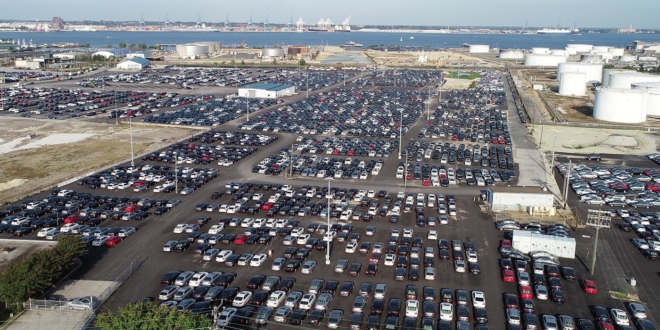
One of AMPORTS’ three terminals at the Port of Baltimore, where the company provided logistics services for 400,000 vehicles in 2017
UPDATED: 11/26/18 9:15 am ET: Corrected
AMPORTS, the largest processor of vehicles at seaports in North America, is solidifying its position with a series of major expansion projects as the vehicle logistics sector engages in an investment race to keep up with growing demand for import and export services.
AMPORTS handled 1.6 million cars and trucks last year.
Two things distinguish AMPORTS from its competitors in the logistics business: First, it operates almost exclusively at seaports; it doesn’t facilitate the shipment of vehicles from assembly plants or at inland rail terminals.

Taylor: Owning land has perks.
Second, it’s the only major processor that owns a substantial amount of the land it operates on. Other companies typically lease space from a port authority for their roll-on/roll-off terminals, which provide vehicle logistics services — washing, applying wrap guard, performing mechanical and body repairs, homologation, customization, undersealing and engine coating.
AMPORTS owns two of the three facilities it operates in the Port of Baltimore, and it has its own port in Benicia, Calif., northeast of San Francisco.
AMPORTS’ footprint
- Baltimore (3 terminals): 400,000 units
- Jacksonville, Fla.: 286,000 units
- Tampa, Fla.: traffic began in August
- Freeport, Texas: 43,000
- Benicia, Calif.: 223,000
- Altamira, Mexico: 197,000
- Lazaro Cardenas, Mexico: 151,000
That control is attractive to automakers, which are frustrated that many ports are squeezing out auto terminals to handle booming container business, CEO Steve Taylor told Automotive News.
“Containers on a per-square-foot basis can be more valuable,” Taylor said, but it is also a more volatile market than vehicles. “And one of the things [auto companies] like about AMPORTS, especially at ports that we own, is that we are the port authority. So, we can decide what we are going to do with the property. And we’re committed. We’re not going to convert it to container space. It will always be RO/RO space.”
Controlling the property also helps AMPORTS manage its cost structure when there is a downturn because it doesn’t have to make lease payments. It can lock its gates and worry only about property taxes and some security expenses, he said.
AMPORTS, which was sold to Toronto-based private equity firm InstarAGF Asset Management in April, is investing in these four locations:
Baltimore
Baltimore is the largest U.S. port for vehicle trade, and AMPORTS accounts for nearly half of its volume. The company recently acquired 60 acres next to its Chesapeake Terminal and plans to spend an additional $24 million on a pier extension to accommodate next-generation car carriers entering the fleet with capacity of up to 8,500 vehicles, and storage space.
AMPORTS, which also rents a public terminal across the harbor, currently preps vehicles for Honda, Mazda and Chrysler at the site. The expansion will enable it to handle as many as 100,000 extra vehicles per year, Taylor said.
Antioch, Calif.
AMPORTS is developing a new port about 15 miles east of its dedicated auto terminal in Benicia after signing a long-term lease on a 100-acre property that used to hold a paper mill. Taylor said Benicia is at capacity, on pace for 250,000 vehicles crossing its docks this year, and the new development will have room to move 150,000 to 175,000 vehicles per year. AMPORTS expects to complete the $30 million development by mid-2020 and is approaching potential customers, primarily ones that ship from Asia and Mexico.

Vehicles are unloaded in Baltimore, where AMPORTS provides services such as washing, repairs and customization.
Construction will involve refurbishing the existing pier, building a service facility and paving land for storage.
Even though AMPORTS doesn’t own the land, it will have the ability under its lease to set its own rates like any port authority, Taylor said.
Altamira, Mexico
In April, Mexican authorities granted AMPORTS a 20-year concession, with a 20-year renewal option, to operate the auto terminal in Altamira. The company previously ran the facility under a series of short-term leases.
In return for exclusive operating rights and long-term certainty, the processor is investing $10 million in repaving, fencing, lighting, upgrading the vehicle shop and storage, Taylor said.

AMPORTS washes vehicles as part of the logistics services it provides at ports in the U.S. and Mexico.
AMPORTS expects to handle 225,000 vehicles at the Gulf Coast port this year. Its primary customers are Kia — which recently opened a large factory in nearby Monterrey — General Motors and Chrysler.
Jacksonville, Fla.
AMPORTS needs more room to operate at the Port of Jacksonville, one of the largest U.S. vehicle ports and an international gateway for 13 automakers. The company is negotiating a 20-year lease at a second terminal where the port authority has created 100 acres for auto traffic by moving cruise terminal parking and making other upgrades. Taylor said the company will phase in expansion on the property over three to four years.
